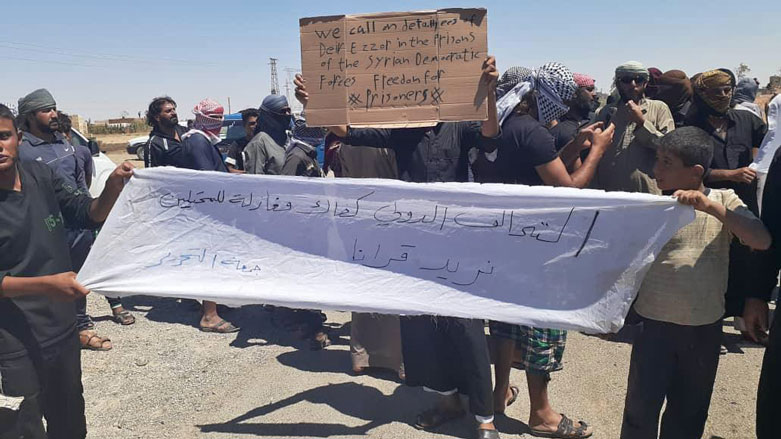SDF releases civilians from Arab-majority Syrian region following protests: Observer

ERBIL (Kurdistan 24) – A human rights watchdog said on Saturday said the Kurdish-led Syrian Democratic Forces (SDF) released eight civilians from the town of al-Shuhayl in Deir al-Zor province who were arrested during operations against Islamic State sleeper cells three weeks earlier.
The UK-based Syrian Observatory of Human Rights (SOHR) claimed that the individuals were arrested on Aug. 8 in the town of Al-Shuhayl on accusation of belonging to the Islamic State.
On Aug. 25, dozens of civilians protested in the Al-Sh’aytat area in Abu Hamam village, east of Deir al-Zor, demanding the SDF and the US-led Coalition release the prisoners, then held in SDF prisons.
SOHR also reported on Aug. 26 that dozens of detainees from Deir al-Zor were released who had been arrested during earlier SDF security campaigns.
“The release came after popular pressure and demonstrations demanded the release of detainees who were imprisoned without a trial or clear charges,” the rights group said.
Another SOHR report on Aug. 23 reported that SDF security forces arrested an old man and teacher in the village of al-Kassar, located near Al-Busayrah in Deir al-Zor province and were later released after “being insulted and humiliated during the investigation.”
Although the SDF and Coalition announced the defeat of the so-called Islamic State’s caliphate in March 2019, sleeper cell attacks by the terrorist group persist in territory liberated by the SDF in what appears to be a deliberate campaign to destabilize the area.
Islamic State militants are especially active in Deir al-Zor where there are still some local networks that maintain links to the group’s members. Furthermore, Syrian regime cells and others linked to Turkey are also active in the region.
According to a monthly report of the Rojava Information Centre (RIC) published on Aug. 10, 79 percent of Islamic State attacks in July occurred in Deir al-Zor, while all of the attacks outside the province were located in either Raqqa or Manbij.
In early June, the SDF launched their Deterrence of Terrorism operation with the support of the US-led Coalition in southern Hasakah and Deir al-Zor, during which 110 suspects were arrested. On July 17, the second stage of the campaign was launched in which 31 suspects were arrested, including one senior Islamic State official.
Moreover, unrest recently increased in Deir al-Zor after the assassination of three leaders of the al-Baggara and al-Akidat tribes in late July. The SDF and the Coalition held several meetings with tribal leaders in recent weeks to help de-escalate the situation.
Recently protests were also held in Deir al-Zor calling for the release of civilians by the SDF. However, they also called on the Coalition and the SDF to expel the regime and Iran-backed militias from the western bank of the Euphrates River.
While the regime controls the western bank, the SDF manage areas east of the river.
Nicholas Heras, Middle East Portfolio Manager at the Institute for the Study of War, told Kurdistan 24 that “flawed intelligence and being at the wrong place at the wrong time are the main reasons innocent civilians are arrested in counter-ISIS operations.”
“ISIS operatives live among the local population, and the operations that hunt them down are not perfect,” he added.
Thomas McClure, a Syria-based researcher at the Rojava Information Center, told Kurdistan 24 that there is a need to professionalize SDF forces in Deir al-Zor, saying, “In any such campaign it is normal that some people will be arrested, questioned and found not to be part of ISIS.”
“Particularly in a chaotic region like Deir ez Zor (Deir al-Zor), facing daily sleeper cell attacks from ISIS and destabilization efforts from the Syrian government and others in a terrain where many individuals still retain support for ISIS. It is tough to balance civilians’ demands for improved security while ensuring that due process is observed and needless arrests avoided.”
Moreover, he added that the SDF tries to use local forces from Deir al-Zor in these operations because they will have more legitimacy on the ground with locals “but are typically less experienced and may have personal grievances or interests in the region, resulting in wrongful arrests.”
“Coalition-supported training programs and transparent mechanisms for addressing complaints can help to reduce the number of such incidents,” he concluded.
Editing by John J. Catherine
